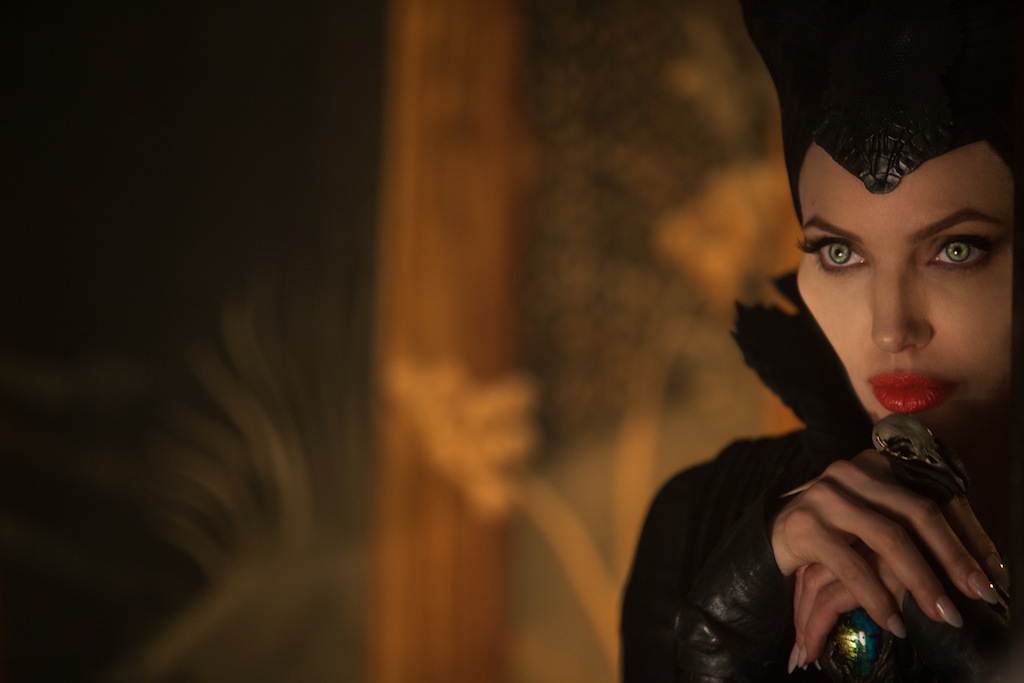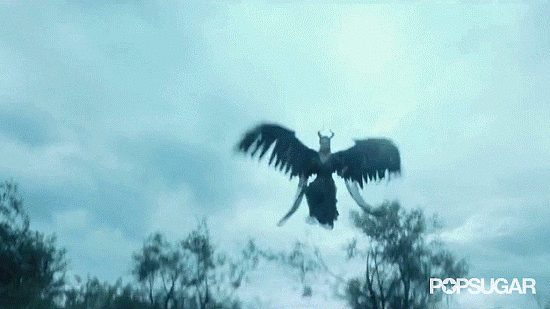Maleficent Is Pretty Bad, But Does It Have Regressive Gender Politics Too?
Maleficent is one of cinema's great villains, yet Disney has turned her into a victim, a Woman Scorned™.

Did you see Maleficent this past weekend? The box office figures suggest that you probably did — it seems that a lot of people will pay to watch Angelina Jolie go all evil on the girl who would become Sleeping Beauty. As a film it is pretty bad: narratively confused, chock full of ugly visual effects, and populated with actors like Sharlto Copley and Elle Fanning, who are given little to do but walk around amongst green screens, looking lost.
Why Take The Villainy Out Of An All-Time Great Villain?
However, what makes Maleficent a particularly terrible film is the way it reconfigures the central character. The character that was once such a deliciously, unapologetically evil creation in the original Sleeping Beauty (1959) — itself based on Charles Perrault’s La Belle Au Bois Dormant and the Grimm Brothers’ Little Briar Rose — has been reimagined as a hero, done wrong by society. This saps the character of the delicious villainy that Jolie and the gothic design promised. As The Playlist opined, “Maleficent was a character that inspired both awe and loathing.” She’s one of the great cinema villains, and rather than giving an out-and-out female anti-hero to cheer for, the powers that be instead saw fit to make her warm and fuzzy. What a yawn!
This is hardly new, of course. Fairy tales have been the subject of revisionist films for years now. Red Riding Hood (2011) with Amanda Seyfried was one such title, but it at least had the good sense to be hilariously terrible. The films that Maleficent more closely resembles are Alice in Wonderland (2010), Snow White and the Huntsman (2012), and Oz: The Great and Powerful (2013). Maleficent’s director, Robert Stromberg, was the Oscar-winning production designer of Alice and Oz, so it shouldn’t be surprising to learn that his new film is about as bad as those ungainly disappointments. The whiff of latter-day Tim Burton hovers over Maleficent, and it is not pleasant.

–
Hollywood And Gender Politics: An Unhappy Marriage
Where Maleficent gets (potentially) interesting is in the critical response to its gender politics. It’s hardly news that very few Hollywood blockbusters are either marketed towards female audiences or built around female protagonists, and perhaps it’s their rarity that makes people dissect them so thoroughly. Or perhaps it’s just because there is something legitimately odd going on in the case of Maleficent.
There are two schools of thought at play regarding the subtext of Maleficent. The first is that Maleficent is actually a radical pro-feminist take on the rape revenge fantasy genre — Disney’s I Spit on Your Grave (1978), if you will. Crave Online even labelled it “the best rape-and-revenge movie in years”, which sounds like an auspicious label if ever there was one. The other way to look at Maleficent is as a backwards take on gender that revels in the sort of dated sexism that has populated many of Disney’s feature films. Meryl Streep doesn’t blast you for no reason, you know.

In Walter Chow’s review of the film at Film Freak Central, he suggests not only that “[Maleficent] hates men”, but that it encompasses the themes of female empowerment. He says all of this, of course, under a pithy image that makes fun of Jolie and husband Brad Pitt’s history of adoption (Vivienne Jolie-Pitt, the couple’s biological daughter, has a very brief role in the film as a young Sleeping Beauty).
The AV Club’s negative review says that “the rape imagery is unsubtle”, but I don’t believe it’s much more than unconscious association. Rather, I found Maleficent to be a film that goes out of its way to be regressive in its representation of women. The film’s seemingly endless prologue (essentially the entire first act) suggests that the winged fairy — she’s not a witch as may be mistakenly assumed — turned evil because a man betrayed her. Yes, the act of betrayal is a particularly nasty one (surely one reason why the film was rated M in Australia, despite being marketed as family-friendly), but while the film reminds us time and time again that Maleficent is smart, resourceful, and a great leader, it’s a cowardly act by a man that turned her into a very literal woman scorned.

–
Disney’s Dodgy Feminist History
Furthermore, Maleficent’s redemption is completed after she embraces motherhood and her position as a matriarch. With Maleficent, Disney appear to be actively suggesting that women cannot even be around children without going wobbly at the knees, before shoehorning in an awkward advertisement for the powers of adoption (Jolie was a producer on the project, so maybe that bit’s more on her). All of this is stark contrast to Frozen (2013), which found a nicely progressive way to deal with its female lead, allowing her to remain single and childless (and, depending on who you believe, a lesbian).
Is this the protagonist that audiences wanted? Trailers promised a vampy Maleficent, with Lady Gaga cheekbones, echoes of Michelle Pfeiffer’s Catwoman (Batman Returns, 1992) and a rotating closet of deliciously evil couture. Director Stromberg has done away with this Maleficent, instead delivering an eyesore of a blockbuster with regressive politics at its heart. It’s a damned shame, but it’s hardly a surprise: when you put a white dude with no directorial experience in charge of a $170 million tentpole film, this is the sort of film you ought to expect.
I assume many audiences will ascribe this entire debate to the critics’ tendency to read too much into films. While that’s actually part of our job description, there’s also the little matter of hoping that films might engage us beyond plot and spectacle. If that engagement occurs outside of the film itself, then so be it. As much as I hated Maleficent, the basic fact that this film is eliciting a discussion at all makes me okay with its existence. Your move, Transformers: Age of Extinction…
–